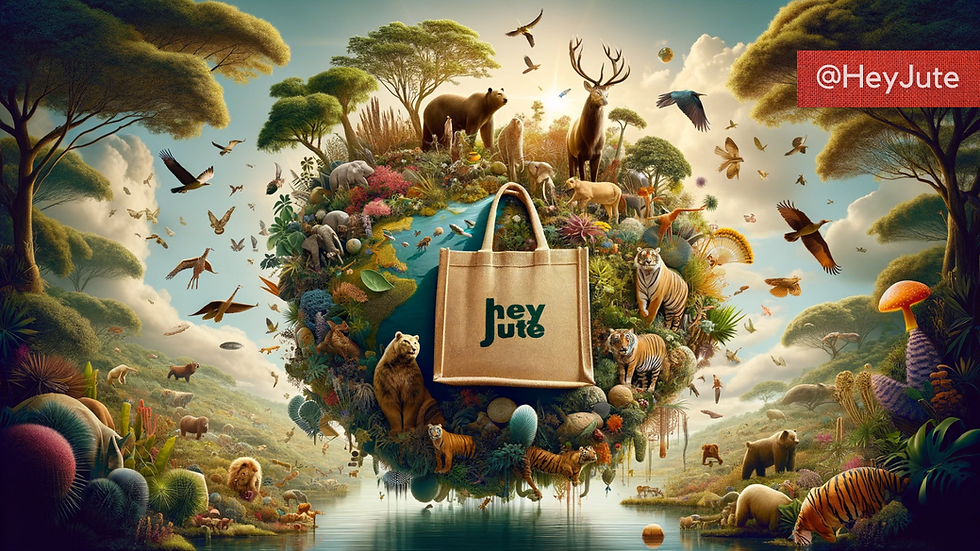New Year, Greener Choices: Kickstarting a Sustainable 2024
- VJ Bala

- Jan 2, 2024
- 3 min read
Introduction
2024 is here! Our planet's health remains at the forefront of global discussions. Last year's environmental challenges were stark reminders of the urgent action needed. From devastating wildfires in Australia to unprecedented floods in South Asia and the rapid melting of Arctic icebergs, the consequences of climate change have never been more evident. High-profile environmental summits brought world leaders together and in fact there were quite a few things to celebrate (read our previous blog). This blog aims to empower you with knowledge and actionable steps to make a meaningful difference in this year ahead.

Embracing Sustainable Habits & Greener Choices
Transitioning to sustainable habits isn't just about small changes; it's about making the right choices. When opting for reusable bags, for instance, the material they are made of, matters. Oil-based plastic reusables are hardly a solution, and paper bags carry their own environmental burdens. Plant based industrial compostable plastic bags are also great, but as long as your municipality has an industrial composter that will accept them. Most of the times, this is yet not the case (although we hope that governments are working hard to make sure industrial composting facilities are more ubiquitous. Ultimately though, choosing truly sustainable materials like jute, which is biodegradable (at home) and has a much lower ecological footprint, is key. Here are eight lifestyle changes to consider:
Switch to Energy-Efficient Appliances: Reducing energy consumption starts at home.
Adopt a Plant-Based Diet: Even a partial shift can significantly lower your carbon footprint.
Practice Water Conservation: Simple habits like fixing leaks and using water-saving fixtures make a difference.
Choose Sustainable Transportation: Opt for public transport, biking, or carpooling.
Support Local and Sustainable Businesses: This reduces transportation emissions and promotes community resilience.
Reduce, Reuse, Recycle: Minimise waste and maximise the life cycle of products.
Engage in Community Environmental Initiatives: Collective efforts have a broader impact.
Educate and Advocate: Share your knowledge and advocate for environmental policies.


The Role of Plant-Based Alternatives
When it comes to plant-based alternatives, not all are created equal. The 'green' label is often misused, leading to misconceptions. For instance, bamboo, while a rapidly renewable resource, undergoes intensive processing to be transformed into fabrics, often diminishing its eco-friendliness. Similarly, organic cotton, though pesticide-free, can still be water-intensive. The key is to look for materials that undergo minimal processing. Jute, used in HeyJute’s products, is an excellent example of a material that is both sustainable and minimally processed, offering a genuinely eco-friendly alternative.


Sustainable Living Beyond Products: Changing Our Language and Actions
Our language shapes our relationship with the environment. Misleading phrases can dilute the gravity of the situation. For instance, saying "we are destroying the planet" can be misleading; it's more accurate to say "we are creating an unsustainable environment for human life." Similarly, "organic" doesn't always equate to "eco-friendly." Understanding these nuances can lead to more informed choices. Here are a few more examples:
"Climate Change" vs. "Climate Crisis": The latter conveys the urgency needed.
"Eco-Conscious" vs. "Eco-Friendly": Being conscious doesn't always translate into action.
"Biodegradable" vs. "Compostable": Not all biodegradable materials break down harmlessly. Everything, including plastic, biodegrades.


Conclusion and Call to Action
As we step into 2024, let's take these lessons to heart. By adopting sustainable habits, choosing the right materials, and using accurate language, we can make a substantial impact. Remember, HeyJute offers more than just products; we provide solutions like private label products and custom packaging designs, helping businesses and individuals make greener choices. Share this message, and let's collectively stride towards a more sustainable future.
Follow us on Instagram @HeyJute and @LilLeafLife for more tips, insights, and updates on sustainable living.
Together, we can make 2024 a landmark year for environmental stewardship.

References
Devastating Wildfires in Australia in 2023:
Wikipedia on the 2023–24 Australian bushfire season: https://en.wikipedia.org/wiki/2023%E2%80%9324_Australian_bushfire_season
Reuters article on Australia's heat wave and bushfires: https://www.reuters.com/world/australia-swelters-through-heat-wave-firefighters-battle-bushfires-2023-11-29/
NASA Earth Observatory on Australia's bushfires: https://earthobservatory.nasa.gov/images/150625/heat-blankets-australia-fuels-bushfires
Unprecedented Floods in South Asia in 2023:
Wikipedia on the 2023 South Asian floods: https://en.wikipedia.org/wiki/2023_South_Asian_floods
Al Jazeera article on South Asia's vulnerability to climate change: https://www.aljazeera.com/news/2023/7/8/what-makes-south-asia-so-vulnerable-to-climate-change
Phys.org on South Asia monsoon floods: https://phys.org/news/2023-07-dead-thousands-shelter-south-asia.html
Rapid Melting of Arctic Icebergs in 2023:
OPB on the Arctic ‘report card’: https://www.opb.org/article/2023/12/15/arctic-report-card-climate-change/
NOAA Climate.gov on the 2023 Arctic Report Card: https://www.climate.gov/news-features/featured-images/2023-arctic-report-card-image-highlights
NOAA on the warmest Arctic summer on record: https://www.noaa.gov/news-release/arctic-summers-warmest-on-record-is-evidence-of-accelerating-climate-change





Comments